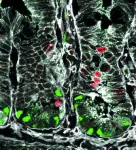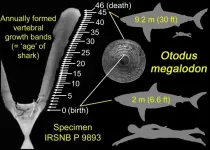Uncovering basic mechanisms of intestinal stem cell self-renewal and differentiation
Promises new approaches to treat diseases
2021-01-11
(Press-News.org) The gut plays a central role in the regulation of the body's metabolism and its dysfunction is associated with a variety of diseases, such as obesity, diabetes, colitis and colorectal cancer that affect millions of people worldwide. Targeting endocrine dysfunction at an early stage by stimulating the formation of specific enteroendocrine cells from intestinal stem cells could be a promising regenerative approach for diabetes therapy. For this, however, a detailed understanding of the intestinal stem cell lineage hierarchy and the signals regulating the recruitment of the different intestinal cell types is critical.
Heiko Lickert and his research group have taken up this challenge. Lickert is director of the Institute of Diabetes and Regeneration Research at Helmholtz Zentrum München, professor of beta cell biology at Technical University of Munich (TUM) and member of the German Center for Diabetes Research (DZD). In the following, Lickert and first author Anika Böttcher talk about their latest paper on the basic mechanisms of intestinal stem cell function published in Nature Cell Biology.
Why is the gut so important for health research?
Heiko Lickert: As the body's digestive and largest endocrine system, the gut is central to the regulation of energy and glucose homeostasis. Intestinal functions are carried out by specialized cells which are constantly generated and renewed every 3-4 days from intestinal stem cells. For example, so-called enteroendocrine cells produce over 20 different types of hormones that signal to the brain and pancreas to regulate for instance appetite, food intake, gastric emptying and insulin secretion from pancreatic beta cells. Another important gut function is exerted by so-called Paneth cells that produce defensins and protect against invading pathogens. Consequently, it is not surprising that intestinal dysfunction is associated with a variety of diseases, such as chronic inflammation,colorectal cancer and diabetes, affecting millions of people worldwide.
What were the most important findings in your latest research about intestinal stem cells?
Anika Böttcher: We improved our understanding of how intestinal stem cells constantly renew and give rise to specialized cell types at unprecedented single cell resolution. Thus, we are now able to describe potential progenitor populations for each intestinal cell and we have shown that for every lineage intestinal stem cells give rise to unipotent lineage progenitors. Furthermore, we identified a specific intestinal stem cell niche signal pathway (called Wnt/planar cell polarity pathway) regulating intestinal stem cell self-renewal and lineage decisions. This is very important, as we know that intestinal stem cells can indefinitely renew and maintain the gut function and tissue barrier. Those are 6 meters of epithelium and more than 100 million of cells generated every day in humans! Moreover, these cells differentiate into every single cell type. The risk of failure in this self-renewal or lineage specification process to result in a chronic disease therefore is quite high.
Using a more technical term, we were able to delineate a detailed intestinal stem cell lineage tree and identified new niche signals. In order to obtain those breaking-through results, we integrated time-resolved lineage labelling of rare intestinal lineages using different reporter mouse lines with genome-wide and targeted single-cell gene expression analysis to dissect intestinal stem cell lineage decisions. Together with Fabian Theis' team of computational biologists at Helmholtz Munich and TUM, we profiled 60,000 intestinal cells. To analyze this data set, we leveraged newly developed machine learning techniques to automatically identify branching lineages and key contributing factors in the gene expression space. The findings are broadly applicable and are equally important for cancer, inflammation and colitis as well as obesity and diabetes.
How can this new knowledge be translated to therapeutic approaches?
Heiko Lickert: This study challenges current paradigms and we advanced our understanding of intestinal stem cell self-renewal, heterogeneity and lineage recruitment. We can use this basic knowledge to map what happens to intestinal stem cell lineage allocation and differentiation during chronic disease. Insights from this will put us in place to develop specific therapies for these diseases by targeting lineage progenitors for example to regenerate the formation of specific cells that are lost during disease progression or to identify and eradicate intestinal cancer stem cells. Specifically, at our institute, we will focus our efforts on diabetes.
INFORMATION:
Original publication
Böttcher et al., 2021: Non-canonical Wnt/PCP signalling regulates intestinal stem cell lineage priming towards enteroendocrine and Paneth cell fates. Nature Cell Biology, DOI: 10.1038/s41556-020-00617-2
Helmholtz Zentrum München
Helmholtz Zentrum München is a research center with the mission to discover personalized medical solutions for the prevention and therapy of environmentally-induced diseases and promote a healthier society in a rapidly changing world. It investigates important common diseases which develop from the interaction of lifestyle, environmental factors and personal genetic background, focusing particularly on diabetes mellitus, allergies and chronic lung diseases. Helmholtz Zentrum München is headquartered in Neuherberg in the north of Munich and has about 2,500 staff members. It is a member of the Helmholtz Association, the largest scientific organization in Germany with more than 40,000 employees at 19 research centers.
[Attachments] See images for this press release:

ELSE PRESS RELEASES FROM THIS DATE:
2021-01-11
How the larvae of colorful clownfish that live among coral reefs in the Philippines are dispersed varies widely, depending on the year and seasons - a Rutgers-led finding that could help scientists improve conservation of species.
Right after most coral reef fish hatch, they join a swirling sea of plankton as tiny, transparent larvae. Then currents, winds and waves disperse them, frequently to different reefs.
During seven years of surveys of coral reef-dwelling clownfish, scientists measured how the dispersal of larvae varied over the years and seasonally, including during monsoons, according Rutgers-led research in the journal Molecular Ecology. They found that larvae dispersal varied a lot on both timescales.
Their research suggests that when scientists ...
2021-01-11
A new study shows that the gigantic Megalodon or megatooth shark, which lived nearly worldwide roughly 15-3.6 million years ago and reached at least 50 feet (15 meters) in length, gave birth to babies larger than most adult humans.
This latest research shedding light on the reproductive biology, growth and life expectancy of Megalodon (formally called Otodus megalodon) appears in the international journal Historical Biology.
Although Otodus megalodon is typically portrayed as a super-sized, monstrous shark in novels and films such as the 2018 sci-fi film "The Meg," scientific data support a more modest but still impressive estimate of about 50 feet (15 meters) for the presently known largest individuals. The ...
2021-01-11
Positive "tipping points" could spark cascading changes that accelerate action on climate change, experts say.
A tipping point is a moment when a small change triggers a large, often irreversible, response.
Professor Tim Lenton, Director of the Global Systems Institute (GSI) at the University of Exeter, has previously warned the world is "dangerously close" to several tipping points that could accelerate climate change.
But in a new paper in the journal Climate Policy, Professor Lenton and Simon Sharpe, a Deputy Director in the UK Cabinet Office COP 26 unit, identify tipping points in human societies that could rapidly ...
2021-01-09
Tokyo, Japan - Researchers from Tokyo Metropolitan University mixed and designed a new, high entropy alloy (HEA) superconductor, using extensive data on simple superconducting substances with a specific crystal structure. HEAs are known to preserve superconducting characteristics up to extremely high pressures. The new superconductor, Co0.2Ni0.1Cu0.1Rh0.3Ir0.3Zr2, has a superconducting transition at 8K, a relatively high temperature for an HEA. The team's approach may be applied to discovering new superconducting materials with specific desirable properties.
It's been over a hundred years since the discovery of superconductivity, where certain materials were found to suddenly show minimal resistance to electrical currents below a transition temperature. As we explore ...
2021-01-09
A new risk-stratification tool which can accurately predict the likelihood of deterioration in adults hospitalised with COVID-19 has been developed by researchers from the UK Coronavirus Clinical Characterisation Consortium (known as ISARIC4C).
Researchers say the online tool, made freely available to NHS doctors from today (Friday 8 January 2021), could support clinicians' decision making - helping to improve patient outcomes and ultimately save lives.
The tool assesses 11 measurements* routinely collected from patients, including age, gender, and physical measurements (such as oxygen levels) along with some standard laboratory tests and calculates a percentage risk ...
2021-01-09
Study of 1,733 patients first diagnosed in Wuhan (China) between January and May followed to June and September.
76% of COVID-19 patients have at least one symptom six months after symptom onset.
Fatigue or muscle weakness is the most common symptom, with sleep difficulties and anxiety or depression also frequently reported.
Lower antibodies against COVID-19 in patients six months after becoming ill compared with during acute infection raises concerns about the possibility of re-infection.
More than three quarters of COVID-19 patients have at least one ongoing symptom six months after initially becoming unwell, according to research published in The Lancet.
The cohort study, looking at long-term effects of COVID-19 infection on people hospitalised ...
2021-01-09
COVID-19 patients admitted to intensive care in the early months of the pandemic were subject to a significantly higher burden of delirium and coma than is typically found in patients with acute respiratory failure. Choice of sedative medications and curbs on family visitation played a role in increasing acute brain dysfunction for these patients.
That's according to an international study published Jan. 8 in The Lancet Respiratory Medicine, led by researchers at Vanderbilt University Medical Center in coordination with researchers in Spain.
The study, which is far the largest of its kind to date, tracks the incidence of delirium and coma in 2,088 COVID-19 patients admitted before April 28, 2020, to 69 adult intensive care units across 14 countries.
ICU delirium is ...
2021-01-08
Hundreds of cancer patients have benefitted from using computer algorithms to manage their symptoms and improve their wellbeing in a unique UK trial.
The early stage colorectal, breast or gynecological cancer patients took part in the trial of the eRAPID system, developed by the University of Leeds, which allowed them to report online symptoms from home and receive instant advice on whether to self-manage or seek medical attention.
Patients reported better symptom control and physical wellbeing in the early weeks of treatment, with the system preventing symptom deterioration in about 9% of patients after 12 weeks. Patients reported more confidence in managing ...
2021-01-08
A year ago, trying to find patients who would agree to see their University of Michigan mental health provider through a video screen felt like pulling teeth.
Only 26 video visits with a few early-adopters had happened in nearly six months, compared with more than 30,000 in-person visits.
But Jennifer Severe, M.D., one of the three psychiatrists who helped launch a test of telehealth initiatives in the U-M's outpatient psychiatry clinic, wasn't about to give up.
She prepared to give a talk at the beginning of April of 2020, hoping to convince more of her colleagues to give telepsychiatry a try, now that a major insurance ...
2021-01-08
Eating a healthy diet, such as the Mediterranean diet, has a positive impact on health, but little is known about the effects of including unhealthy foods in an otherwise healthy diet. Now researchers at Rush University Medical Center have reported diminished benefits of a Mediterranean diet among those with high frequency of eating unhealthy foods. The results of their study were published in Alzheimer's & Dementia: The Journal of the Alzheimer's Association on Jan. 7.
"Eating a diet that emphasizes vegetables, fruit, fish and whole grains may positively affects a person's health," said Puja Agarwal, PhD, a nutritional epidemiologist and assistant professor in the Department of Internal Medicine at Rush Medical College. "But when it is combined with fried food, ...
LAST 30 PRESS RELEASES:
[Press-News.org] Uncovering basic mechanisms of intestinal stem cell self-renewal and differentiation
Promises new approaches to treat diseases





